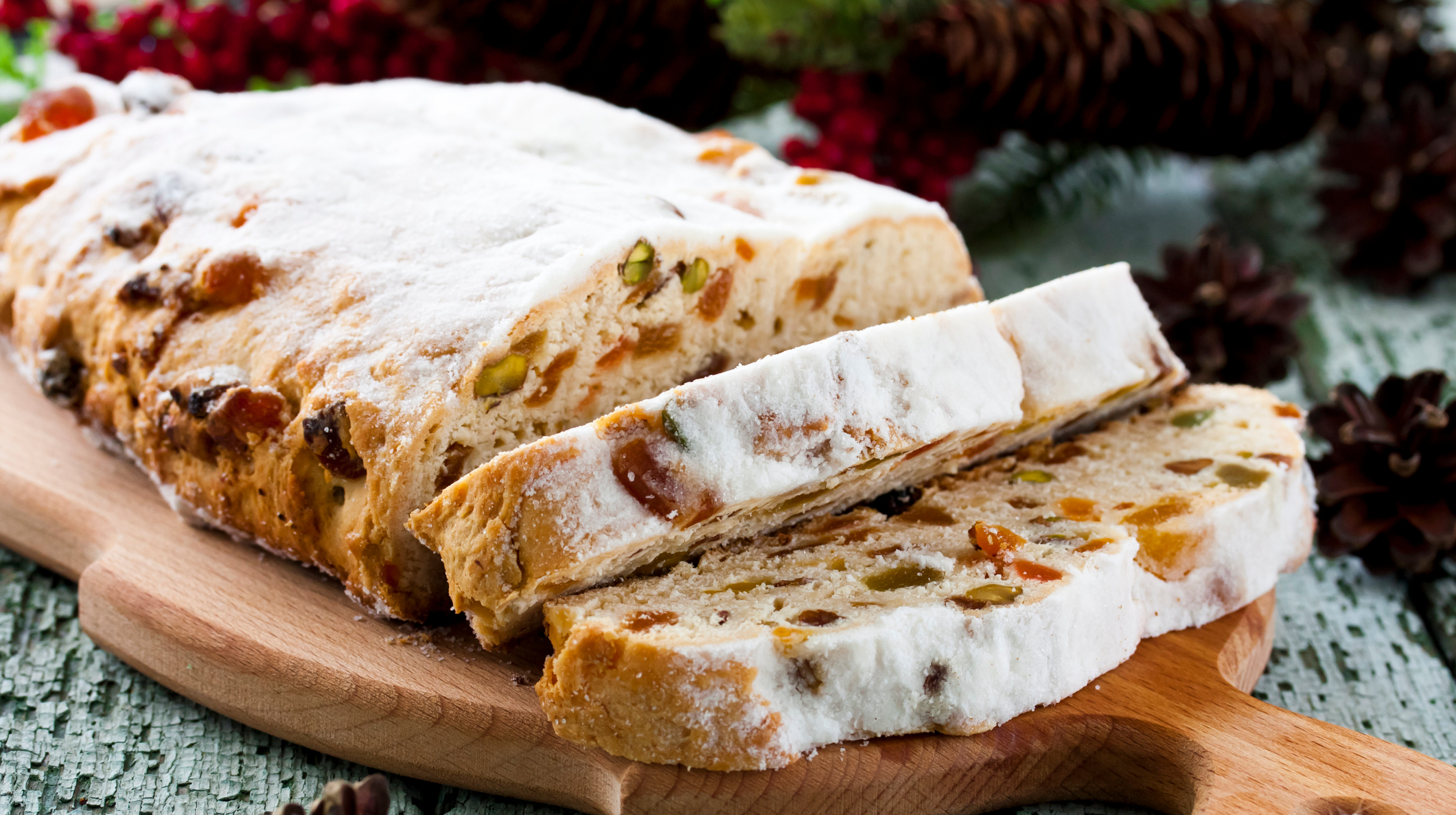Stollen Is The German Holiday Bread That Can't Shake Its Fruitcake Resemblance
I have a hidden holiday dessert wrapped in foil and stashed in the back of my pantry. It's not cookies or candy, and if I'm being honest, I don't need to hide it. No one is stealing my stollen.
Stollen, a type of German holiday bread, bears an unfortunate similarity to fruitcake, which is why it's hardly the first item to go at a Christmas party, unless the party attendees are in the know. And if they're in the know, they recognize that stollen is one of the most treasured holiday treats there is—dried fruit and all.
My Oma has baked stollen every year since I was little, mailing it from her kitchen in Florida to my parents' house in New Jersey. Now that I'm an adult with my own home, she mails me a loaf, too. She complains about the baking process every year, so that her complaints have themselves become a tradition. Every year, she says she's getting older and the baking gets harder, and she's really going to whittle down the number of stollen she bakes this year. Really. Maybe just one for each of her daughters, one for me, three for the church bake sale, one for the neighbor....

I didn't appreciate the time and effort these loaves took until I helped her bake them a few years ago. There's yeast to be revived and added to the bread, which then has to be kneaded, let rise, punched down, formed into logs, and rested again. Where my Oma's arms were once so strong, capable of mixing starchy spaetzle batter in marathon bouts, she now struggles to press out the stollen dough, and takes frequent breaks. The dried fruit—in her recipe, golden and regular raisins, plus currants—also need to soak for hours in cognac. (Oma offers that this is a great opportunity to have a nip of cognac yourself.) Then, the loaves are left to cool, at which point they can be drizzled with my favorite part: the confectioner's sugar icing.
Finally helping my Oma bake her stollen only added to my appreciation for them. Rituals around food add to their enjoyment, so that the effort it takes to bake these loaves makes each slice of the bread that much more impressive. After the baking itself is done, Oma begins her detailed method for wrapping and packaging the loaf to ensure it arrives at my door each December with nary a raisin out of place: She sets the stollen on a foil-covered length of cardboard, then wraps the entire mass in wax paper, then wraps that in foil before sliding it into a repurposed newspaper sleeve and surrounding that with bubble-wrap for good measure. German precision engineering, I suppose. Like fruitcake or fine wine, stollen not only withstands time but improves with proper storage, so I keep the loaf inside its foil-and-plastic sarcophagus, carefully unwrapping and rewrapping it each time I crave a piece.
This tedious unwrapping and rewrapping, combined with stollen's aforementioned public-image struggles that discourage friends from sampling it, means a loaf will last me almost the entire month of December if I ration it well. I usually carve off a thin slice each morning with my coffee; stollen and coffee are truly a divine combination, both in flavor and texture. Coffee melts the bread's considerable denseness and cuts the icing's sugar content, while the liquor-soaked fruit highlights the berry notes in brighter coffee beans. It's one of the rare homemade foods that I treat as a ritual: a morning coffee, my slice of stolen, no distractions.

My boyfriend isn't crazy about stollen, and most of my friends will politely pass when I offer a slice. I think they're deranged for not appreciating its dense, yeast-rich flavors, its gold nuggets of lightly sweet fruit, its ribbon of sweet frosting. Maybe they need to bake with Oma to appreciate it, or maybe their socially conditioned disdain for fruitcake is simply too strong.
Next year I need to begin baking stollen for myself, not only to keep my Oma's tradition afloat but to ensure my steady access to it should she ever retire from holiday baking as she's threatened to for the past decade. Mine won't be quite right on the first try, I'm sure, because Oma is a yeast-whisperer par excellence. But maybe baking it myself will deepen my enjoyment, birthing a new ritual that infuses the holiday bread even further. If not, there's always that leftover cognac with which to console myself.
